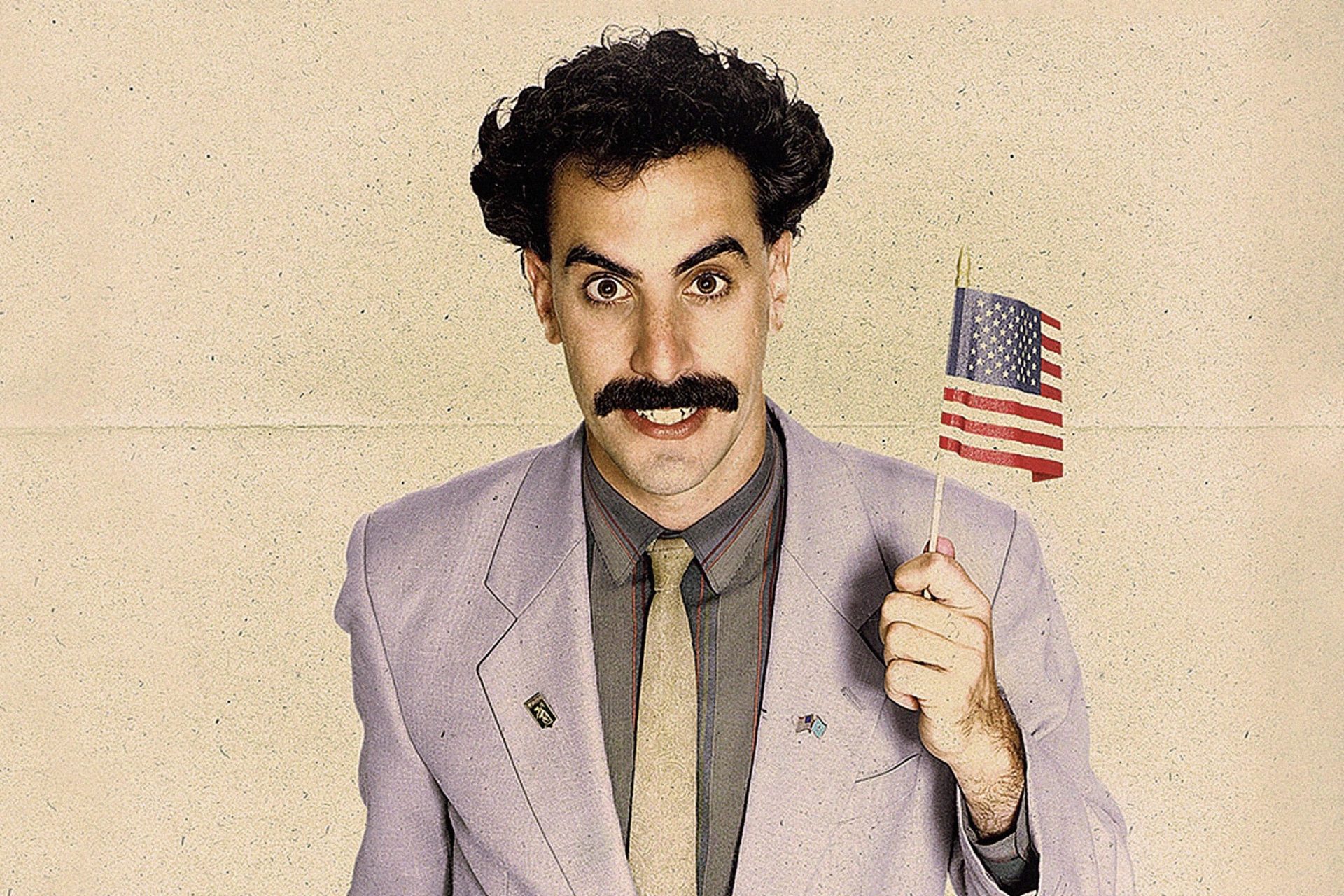Talk about a movie whose title works terribly with search engine optimization algorithms. Let’s not forget, the title is not just Borat. The title is Borat: Cultural Learnings of America for Make Benefit Glorious Nation of Kazakhstan. It’s not enough that the title is in broken English. The subtitle alone goes the extra mile by including its subject and its purpose across eleven words. Despite this word salad, it is a wonderful title for a comedy that spins dozens of plates at once. On the surface, it might seem like a typical “fish out of water” story and little else. But underneath that is a comedy that skewers American culture with such precision it can’t help but be hilarious.
In fact, the skewering is palpable in the film’s premise. One day, Kazakh journalist Borat Sagdiyev (Sacha Baron Cohen) decides to travel to the United States to learn more about its culture. As he wants his country to learn about America as well, he brings a producer named Azamat (Ken Davitian) and a camera operator to document his experiences. From there, they travel across the country to confront how distinct the United States really is. Most notably, Borat has trouble processing the idea that women can be intelligent and independent.
Based on this premise, it’s clear that Cohen and his co-writers take inspiration from one of the most common documentary types in America: the travelogue. After all, travelogues function as a learning experience for the audience and the people involved. And in the case of country travelogues, they present as many aspects as possible. This can range from how the population uses local resources to the country’s political infrastructure. What makes this particular example so fascinating is that the filmmakers actively expose the format’s limitations. As informative as travelogues are, they often contain so much information that people struggle to latch onto what it all means.
The same can be said about Borat since it jumps between various topics within its trim 84-minute runtime. To name a few, we see Borat take driving lessons, learn how to construct jokes, and perform correct party etiquette. Eventually, it takes a detour to focus on Borat’s newfound love for Pamela Anderson after watching one episode of Baywatch in his hotel room. By the end, it’s hard to tell what these moments add up to other than “that sure was a lot”. But since the film takes such joy in copying the conventions of a documentary, the fact it moves at a breakneck pace is funny in itself.
However, the plotting is not the only way the movie replicates the feel of a documentary – or even the best way. As it turns out, director Larry Charles commits to the documentary feel by giving the film a rough aesthetic. Like most documentaries in the mid-2000s, Charles shoots each scene on digital cameras with handheld camerawork. The closest it gets to having a memorable style comes in the form of the on-screen text. From the character introductions to the end credits, all onscreen text features an English translation that lazily replaces the original Romanian text. Even then, this choice is in service to giving an absurdist scenario a sense of authenticity.
READ: ‘The War with Grandpa’ Review: “Dated & Confused”
Speaking of which, it is amazing to see Borat mine so many forms of comedy out of this one concept. As expected, some gags exist to ridicule Borat’s poor attempts to act like an American. For example, one scene involves him at a hotel acting like a group of friends he met in the ghetto. Not only do his pants sag below his waist, but he also uses the same slang as that group. The only difference is that Borat looks like an idiot when he does these things. One can imagine a less talented writer and actor struggling to make these scenes enjoyably cringy. With Cohen’s goofy presence, however, these “fish out of water” moments are only as awkward as they need to be. It certainly helps that Cohen’s tall, wiry frame makes Borat appear like an outcast in comparison to the other characters.
Elsewhere, there are jokes that largely exist to provide maximum shock value. Sometimes, this manifests in the form of Borat showing nude photos of a relative to unsuspecting individuals. When it’s not that, it takes the form of a fight scene that sees Borat and Azamat pin each other down in ways that resemble sex positions. Not to mention, both of them are nude for the entirety of this section! Truth be told, this is by far the least sophisticated humor the film has to offer. Nevertheless, Cohen’s deep commitment to the material is admirable. At the very least, this explains why shock value became a fundamental aspect of all subsequent Cohen creations.
Best of all, it gets comedic mileage out of its unflattering depiction of American values. Keep in mind, Borat’s journey takes place only a few years after 9/11. This means that many American citizens have two thoughts in their heads: support their troops and distrust people from third-world countries. By placing someone like Borat in front of these people, the movie beautifully reveals these thoughts as nonsense. Ideally, an American audience would be more uncomfortable with an outsider supporting The War on Terror than that person changing the American national anthem to be about his own. But as the country is far from an ideal state, people instead react to the national anthem change with greater disgust.
By the way, that’s an example of the movie slowing down to show dim-witted Americans. More often, it sneaks its commentary into the smaller comedic setpieces. In one sequence, Borat enters an antique store and makes a fool out of himself by breaking expensive items. On the one hand, it strikes a funny bone thanks to Cohen acting as clumsily as possible. On the other hand, it is discomforting due to what we learn about the shop owner. Specifically, the owner places Confederate flags throughout the shop in order to “maintain the heritage”. While this detail is minor compared to Borat’s antics, the owner’s casualness to this fact demonstrates how normalized old ideals can be.
With all these elements working together, Borat becomes a comedy that’s nothing short of a miracle. To see it expose so many genuine and ugly aspects of America in such a short time is a feat in itself. Furthermore, Borat himself has such a strong personality that he manages to charm just by existing. Cohen did not have to present this story as a mockumentary, but bless him for doing so. Thanks to this style, I never stopped questioning whether the film’s reality was actually our own. And what is the sign of a great satire but exactly that? – Mark Tan
Rating: 9/10
Borat is available on Blu-ray and Digital HD.
The film stars Sacha Baron Cohen, Ken Davitian, Luenell, Pamela Anderson, Bob Barr, and Alan Keyes.










Leave a Comment